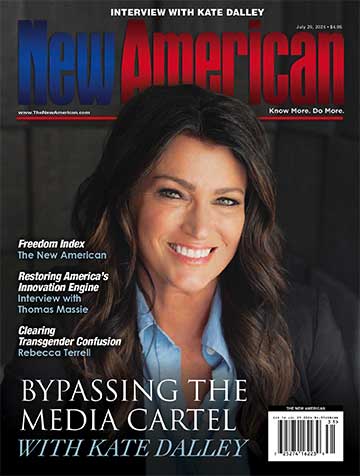
Kansas Governor Sam Brownback issued an executive order on July 7 that prohibits the state government from taking any action against any individual clergy, religious leader, or religious organization that “acts in accordance with a religious belief or moral conviction that marriage is or should be recognized as the union of one man and one woman.”
The governor said his order protects “Kansas clergy and religious organizations from being forced to participate in activities that violate their sincerely and deeply held beliefs.”
Brownback issued the executive order, entitled “Preservation and Protection of Religious Freedom,” in reponse to last month’s U.S. Supreme Court ruling in the case of Obergefell v. Hodges, mandating recognition of same-sex “marriage” in all 50 states. In the order, he cited the First Amendment of the U.S. Constitution, Section Seven of the Bill of Rights of the Kansas Constitution, and the Kansas Preservation of Religious Freedom Act (which he signed in 2013), all of which protect the religious liberty of Kansans. He quoted from the latter, which provides that state government shall not “substantially burden a person’s civil right to exercise of religion.”
Building on that legal foundation, Brown noted that “the recent imposition of same sex marriage by the United States Supreme Court poses potential infringements on the civil right of religious liberty” and that “government actions and laws that protect the free exercise of religious beliefs about marriage will encourage private citizens and institutions to demonstrate tolerance for those beliefs and convictions and therefore contribute to a more respectful, diverse, and peaceful society.”
Getting down to specifics, Brownback ordered:
The State Government shall not take any discriminatory action against any individual clergy or religious leader on the basis that such individual declines or will decline to perform, solemnize, or facilitate any marriage, based upon or consistent with the individual’s sincerely held religious belief or moral conviction
The four Catholic bishops in Kansas issued a joint statement urging state officials to make the enactment of new legal protections for those who are opposed in conscience to same-sex marriage a top priority in coming months. The bishops praised Brownback’s order and said in a statement: “Generations of Americans have taken freedom of conscience for granted. We, sadly, do not have that luxury anymore.”
Texas Governor Greg Abbott recently issued a similar memo to all agency heads in his state, granting state employees who object on moral grounds to same-sex marriage some protection against the ruling. Abbott’s memo stated: “All state agency heads should ensure that no one acting on behalf of their agency takes any adverse action against any person, as defined in Chapter 311 of the Texas Government Code, on account of the person’s act or refusal to act that is substantially motivated by sincere religious belief.”
While orders such as Brownback’s and Abbott’s mitigate some of the most harmful effects of the Supreme Court’s overreaching decision on same-sex “marriage” — about which Justice Samuel Alito said in his dissent, “The Constitution leaves that question to be decided by the people of each State” — they fall far short of other remedies available to the states. One such remedy is nullification, a little-used technique in recent history, but a viable one nevertheless. As Joe Wolverton noted in a recent article for The New American on the prospect of states using nullification to resist the application of Obergefell v. Hodges within their borders:
Nullification, whether through active acts passed by the legislatures or the simple refusal to obey unconstitutional directives, is the “rightful remedy” for the ill of federal usurpation of authority. Americans committed to the Constitution must walk the fences separating the federal and state governments and they must keep the former from crossing into the territory of the latter.
Wolverton cited no less an authority on the Constitution than Thomas Jefferson to support the legitimacy of nullification, quoting from the Founding Father’s statement in the Kentucky Resolutions:
That the several states who formed that instrument [the Constitution], being sovereign and independent, have the unquestionable right to judge of its infraction; and that a nullification, by those sovereignties, of all unauthorized acts done under colour [sic] of that instrument, is the rightful remedy.
Though nullification is a valid, constitutional option, no state has thus far made an attempt to apply the principal to Obergefell v. Hodges. Granted, it has been only a few weeks since the decision was made, and such matters take time. However, that is all the more reason why serious discussions to consider that possibility should now be taking place.
One of the strongest statements suggesting nullification came from former House Majority Leader Tom DeLay (R-Texas), who said on Newsmax TV’s The Steve Malzberg Show shortly before the High Court handed down its decision that the states should ignore any Supreme Court ruling in favor of same-sex marriage.
“A ruling by the Supreme Court is nothing but an opinion if the legislative branch and the executive branch do not enforce it,” said DeLay. “Not only that, if the states would just invoke the 10th Amendment and assert their sovereignty, they can defy a ruling by the Supreme Court. It’s in the Constitution. We can tell the court what cases they can hear.”
What DeLay described regarding telling the federal courts which cases they can hear is governed not by the 10th Amendment, which protects the sovereignty of the states, but by Article III, Section 2 of the Constitution, which gives Congress the power to make exceptions to and regulate the jurisdiction of the federal courts. Former Representative Ron Paul (R-Texas) attempted to utilize this power when he introduced his We the People Act in 2004 and 2009. The bill, if it had passed, would have removed jurisdiction of federal courts from cases involving the establishment of religion, sexual orientation, abortion, and marriage.
Invoking such power made more practical sense when DeLay mentioned it prior to Obergefell v. Hodges being decided. Since the court has now ruled, it would be difficult to rescind its jurisdiction to decide on marriage cases retroactively. However it is not too late to use the other tool that DeLay recommended, the 10th Amendment, to which Justice Alito alluded when he said, “The Constitution leaves that question to be decided by the people of each State.”
If the decision should be decided by the states, then the states must declare that the power usurped by the Supreme Court in rendering that decision is null.
Related articles:
Political Leaders Voice Discontent With Supreme Court Marriage Ruling
Catholic Leaders Vow to Stand Against Contraception Mandate, Same-sex Marriage
Texas AG: “Reach of Court’s Opinion Stops at the Door of the First Amendment”
Supreme Court Rubber Stamps Same-sex “Marriage” — Time for Nullification
Rome: Hundreds of Thousands Protest Against Same-sex Unions
Sen. Lee and Rep. Labrador Propose Protection for Religious Liberty
Southern Baptist Leader: Prepare for Civil Disobedience Over Gay Marriage Ruling
As Gov. of Texas, Would Abbott Continue to Stand for States’ Rights?



